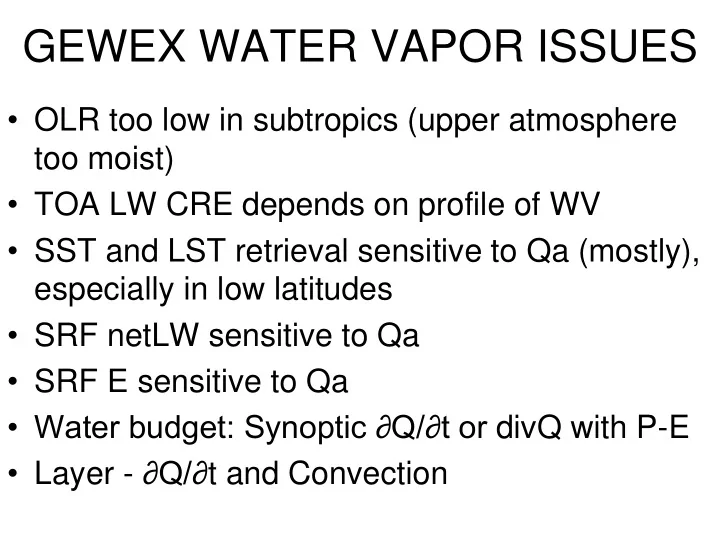

GEWEX WATER VAPOR ISSUES • OLR too low in subtropics (upper atmosphere too moist) • TOA LW CRE depends on profile of WV • SST and LST retrieval sensitive to Qa (mostly), especially in low latitudes • SRF netLW sensitive to Qa • SRF E sensitive to Qa • Water budget: Synoptic ∂Q/∂t or divQ with P-E • Layer - ∂Q/∂ t and Convection
ISCCP — nnHIRS
ISCCP--nnHIRS QUANTITIES Temperature (Kelvins) at Surface (“2m”), 900, 800, 740, 680, 620, 560, 500, 440, 380, 320, 260, 200, 150, 100, 50, 10 mb Tropopause Pressure/Temperature, Surface Pressure/Temperature and Maximum Temperature at a Pressure (peak of surface inversion or highest level reported for isothermal layer) Percent Relative Humidity at Surface (“2m”), 900, 800, 740, 680, 620, 560, 500, 440, 380, 320, 260, 200, 150, 100, 50, 10 mb -- (0.5 – 110% relative to Liquid at T ≥ 273 K, 0.5 – 150% relative to Ice at T < 273 K, added SWOOSH) ** Layers below the surface report -1000, Maximum Surface Pressure = 1019 mb; Minimum Tropopause Pressure = 100 mb
SAMPLING ISSUE
TIMELINE OF NUMBER OF SATELLITES AVAILABLE EACH MONTH 4 3 2 1 1980 2010
OLD PROCEDURE -- 2 sats
Percent Frequency of NO Tropopause (divided by 10)
Recent Results Indicate PT as small as 80 mb
nnHIRS PROCESSING • INPUT into 1° equal-area map for 24 LST per day • VERTICAL INTERPOLATION (adjust PS) • HORIZONTAL FILL – Zonal interpolation (± 5) – Meridional interpolation (± 3) • Calculate (bias-corrected) DAILY MEAN • INTERPOLATE Daily Means (± 5 days, mon, climo) • DIURNAL (PCA) OR LINEAR INTERPOLATION • Combine with SWOOSH (interpolate)
nnHIRS – AIRS Specific Humidity at 1013 mb (g/kg) nnHIRS MEAN = 11.1 g/kg MEAN DIFF = +0.02 g/kg STD DEV DIFF = 1.6 g/kg
nnHIRS – AIRS Specific Humidity at 680 mb (g/kg) nnHIRS MEAN = 3.5 g/kg MEAN DIFF = +0.5 g/kg STD DEV DIFF = 0.7 g/kg
RHA Our limits are 0.5% and 110% (liq) or 150% (ice) 0.77% with RH > 200% and 18% with RH < 0.5%
Map of frequency of re-set for RHA
RH300 Our limits are 0.5 % and 150% 18% with RH > 200% and 0.07% with RH < 0.5% Recent Results indicate RH100 as much as 170%
Map of frequency of re-set for RH380
“Diurnal” Amplitude of Qa
SAHARA Q VALUES
SOBS 1-4
Collapse of Weighting Functions
“Diurnal” Qa Variation Q for near surface 2 year period – August Amplitude of the fitted data (what goes into the PCA if used)
Calibration Issue • Looks like no problem at warm end but still a problem at cool end ???
SUMMER MIDLATITUDE LAND
40 N , 150 E SUMMER MIDLATITUDE OCEAN
JANUARY 2002-2004 MEAN TS (+1) – TA during DAY
JANUARY 2002-2004 MEAN TS (+1) – TA during NIGHT
AUG DAY AUG NIGHT JAN DAY JAN NIGHT
ARCTIC WINTER INVERSION 1989 01 GMT 0
PROFILE OVER HIGH TOPOGRAPHY Antarctica, 1989 01 GMT 0
Lat 20 N, long 50 E NNHIRS GMT 6, GMT 21 DESERT DAY & NIGHT
“Diurnal” Amplitude
“Diurnal” Amplitude
Recommend
More recommend